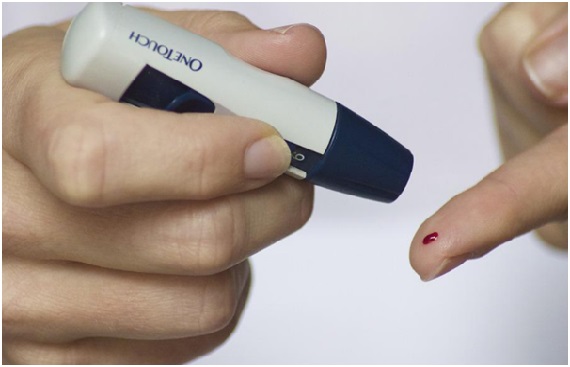High Blood Sugar Levels Can Occur Even in Non-Diabetics

Blood sugar levels can rise even in people without diabetes. A sedentary lifestyle is the leading cause of high blood sugar levels in non-diabetics. Stress and chronic conditions can also raise blood sugar levels in non-diabetics if your blood sugar levels reach above 180 mg/dL after 2 hours post-meal. The condition is known as non-diabetic hyperglycemia. It can be caused due to an illness or injury.
Hyperglycemia can prevent healing and can increase your risk of infections. If untreated, hyperglycemia can damage your nerves, arteries, and organs. Damage to arteries may increase the risk of cardiovascular diseases. Let us discuss the various treatment options available for non-diabetics, learn about the diabetes program that assists you in bringing your sugar levels down, and find out what causes blood sugar to rise in non-diabetics.
Symptoms of high sugar levels in people without diabetes:
- Increased thirst
- Abdominal pain
- Headache
- Nausea and vomiting
- Fatigue
- Headache
- Blurred vision
What causes blood sugar to rise in non-diabetics?
If you have been thinking about what causes blood sugar to rise in non-diabetics, various factors contribute to the rise in blood sugar levels in non-diabetics:
- Polycystic ovarian syndrome: This condition causes hormonal imbalances in women of reproductive age.
- Stress: Unmanaged stress causes an increase in hormones such as cortisol and adrenaline that raise blood sugar levels.
- Poor diet: Consumption of foods with high carbohydrate content like white rice, pasta, fried foods, or processed foods.
- Illness or injury: Stress due to injury or surgery can lead to high blood sugar levels in non-diabetic people.
- Dehydration: Less water in the body could lead to concentrated blood sugar levels.
- Infections: Any infection can cause a rise in blood sugar levels
- Obesity: Fat cells in excess make your body resistant to insulin.
- Medication: Certain medications, immunosuppressants, and corticosteroids may activate enzymes in your blood that can cause a rise in your blood sugar levels. Your body cannot get sufficient energy from sugars in your blood, and you might feel tired all day.
- Insufficient sleep: Not getting enough sleep can make your body utilise less insulin.
- Family history: Your genetic makeup can make you susceptible to spikes in sugar levels, though you do not have diabetes. Non-diabetic people with a family history of diabetes are more likely to experience high blood sugar levels.
- Lifestyle: Physical inactivity can lead to high blood sugar levels in non-diabetics.
- Cushing’s syndrome: It is a disorder of the endocrine system when the body produces too much cortisol. Cortisol is a hormone that can cause insulin resistance. As a result, blood sugar levels are elevated in non-diabetic people.
Tips to manage blood sugar levels
- Choose an active lifestyle. Physical exercise is essential to keep your blood sugar levels in check.
- Eat a well-balanced and nutritious diet that contains plenty of fresh vegetables, fruits, beans, whole grains, and nuts.
- Drink sufficient amounts of water to keep yourself hydrated throughout the day.
- Get sufficient sleep.
- Try and eliminate the stress factors in your life. Practice relaxation techniques like breathing exercises and yoga.
- Quit smoking, as nicotine and other chemicals found in cigarettes can make your blood sugar levels hard to control apart from causing lung damage.
- Limit alcohol intake. Alcohol can increase your blood sugar levels. It is advisable to drink alcohol moderately.
- Take measures to prevent obesity and maintain a healthy weight. Talk to your healthcare provider and get yourself started on a weight loss plan if you are obese.
- Discuss the option of taking part in a diabetes program that helps to reduce hyperglycemia in non-diabetic people.
When to call a doctor
Any injury or illness can cause hyperglycemia. The condition usually resolves when the wound heals and stressors are removed. However, consult your doctor immediately if you experience symptoms like fever, diarrhoea, severe headache, seizure, breathlessness, fruity breath, weakness, or confusion post an illness or injury. Your doctor will measure your blood sugar levels with a blood test and prescribe medications or insulin to lower your blood sugar levels. Early diagnosis and treatment can help control and manage your blood sugar level. Enrolling in a diabetes program along with the therapy can be beneficial in controlling and managing your blood sugar levels.
Summary
Non-diabetic hyperglycemia is a condition that causes high blood sugar levels in non-diabetics. Any injury, surgery, or illness can cause high blood sugar levels. Your disease’s treatment and healing will become problematic if you have non-diabetic hyperglycemia. If left untreated, non-diabetic hyperglycemia can lead to further complications. To bring your blood sugar levels down, stay active, eat well, quit smoking, take your medications on time, and limit your alcohol intake. If you notice symptoms such as fever, headache, or breathlessness, you should contact your doctor. Your doctor will advise taking insulin or medications to bring your blood sugar levels back to normal. Talk to your healthcare provider about your treatment options. Enrol in a diabetes program that helps you manage your blood sugar levels.


.jpg)
